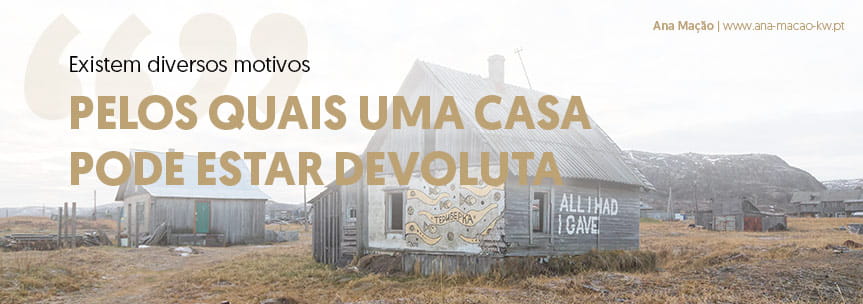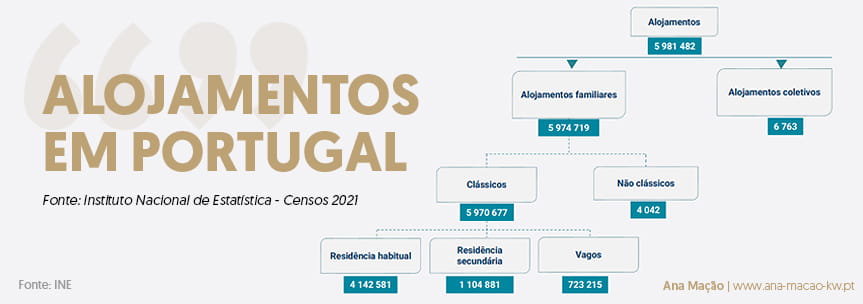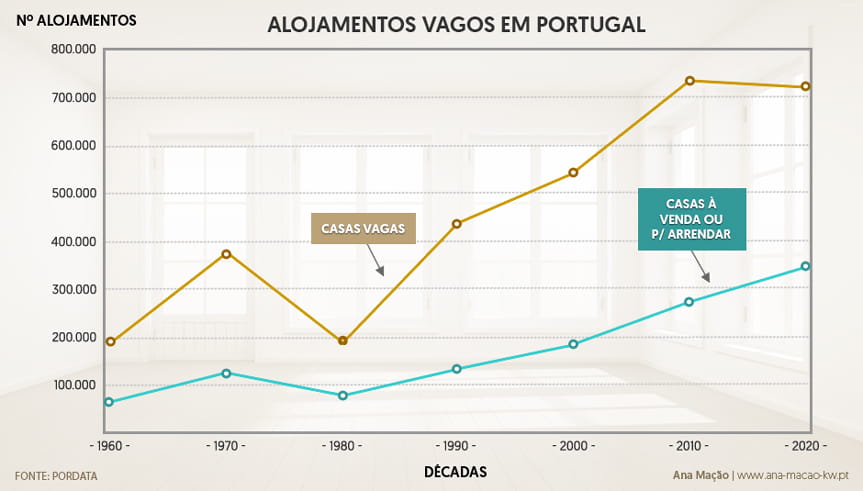Vacant House
The urban building or the autonomous fraction that has been vacant for more than 1 year is considered to be vacant . Find out everything about the meaning of "Casa Devolved", exceptions to this classification, tax penalties , coercive lease of vacant apartments, how many and where there are more vacant houses in Portugal, etc.
Index
- What is a vacant house?
- Exceptions to the definition of fraction or vacant building
- What are the reasons for a house to become vacant?
- What are the exceptions that prevent a house from becoming vacant?
- Negative consequences of having a vacant house
- Where are there more vacant houses in Portugal?
- What to do with a vacant house?
- Frequently Asked Questions about vacant houses
What is a vacant house?(Top▲)
In Portugal and according to the law, a vacant house is a house that has been abandoned or unoccupied for more than 1 year. This is usually due to financial problems, such as bankruptcy, lack of maintenance resources, legal issues associated with the division of inheritances, by someone who has no interest in selling it or putting it on the lease market, etc.
Exceptions to the definition of fraction or vacant building (Top▲)
The urban building or autonomous fraction is not considered vacant:
- That it is intended for short-term housing, on beaches, countryside, spas and any other vacation spots, for temporary lease or for own use;
- Houses of emigrants or people displaced for health, professional or training reasons;
- During the period in which rehabilitation works are carried out, as long as they are certified by the municipalities;
- Whose completion of construction or issue of license for use occurred less than one year ago;
- When the owners are absent, in a home or other social facility, or are on an informal caregiver mission, as long as this is duly proven.
What are the reasons for a house to becomereturn? (Top▲)

There are several reasons why a house becomes vacant, among them are:
- Financial problems: Owners may not have the financial resources to maintain the house, pay taxes, maintenance expenses and other expenses related to the property. These problems can lead to the abandonment of housing.
- Inheritance without interest: In some cases, the house may have been inherited by someone who has no interest in maintaining it, or because the heirs could not agree on what to do with the property.
- Bankruptcy of owner companies: When a company owning a house goes bankrupt, the house can be abandoned or vacated, due to lack of resources for maintenance and payment of taxes.
- Migration: When owners move to another city or country, leaving the house empty and abandoned.
- Urban planning: In some cases, governments can buy properties for urban development projects and then leave them abandoned pending construction.
- In the process of being sold or leased: Because it has not yet been possible to sell or lease it, despite being actively promoted in the market. There are houses that remain in this "limbo" for years, due to lack of interested parties.
In general, lack of care and maintenance is the main cause of home abandonment. Regardless of the reason, vacant houses are a problem for the community and for the owner himself, who can be held responsible for damages or injuries that occur on the site.
What are the exceptions that prevent a house from becoming vacant? (Top▲)
There are some situations that can prevent a house from being classified as vacant, even if it is unoccupied or unused:
- Properties used seasonally: Properties occupied only at certain times of the year, such as vacation homes or properties designated for seasonal activities, may not be considered vacant if seasonal use is justified.
- Absent Owners: Homes may not be considered vacant if owners are in nursing homes, providing ongoing care, have health issues, are away for work, or are in training.
- Pending licenses or authorizations: Properties awaiting licenses, authorizations or other documents for use or occupation may be excluded from the vacant classification until these processes are completed.
- Rehabilitation or remodeling works: Properties undergoing renovation or rehabilitation works are not considered vacant if the works are continuous and within the established deadlines.
- Pending legal proceedings: Properties involved in legal proceedings that prevent occupation or use may not be considered vacant while the proceedings are pending. Examples include disputes relating to ownership, inheritance or tenancy of the property.
- Newly purchased or inherited properties: Newly purchased or inherited properties may have a grace period during which they are not considered vacant, allowing new owners to organize their plans for the property.
- Properties of historical, cultural or architectural interest: Properties classified as "of historical, cultural or architectural interest" and which are being preserved or protected due to these characteristics may not be considered vacant.
- Reasons for force majeure: Properties affected by natural catastrophes, fires or other unforeseen situations that temporarily make use or occupation impossible may be excluded from the vacant classification.
Negative consequences of having a vacant house (Top▲)
Vacant homes can have a number of negative legal and tax consequences. Article 29 of the Basic Housing Law establishes the legal framework for penalty measures to be applied to owners of vacant houses:
Article 29 - Tax policy and tax measures
1 - Fiscal policy, in terms of housing:
(...)
f) Penalizes vacant housing, under the terms of the law.2 - Municipalities may, under the terms of the law, set different rates of taxes, whose level of taxation is assigned to them, depending on the actual housing use.
Tax penalties for a vacant house (Top▲)

Vacant houses in Portugal can be penalized with taxes and other fees, such as:
The Municipal Property Tax (IMI) is an annual tax levied on the VPT-Valor do Patrimonial Tributário of the property, that is, the value for which the property would be sold under normal market conditions. In the case of a vacant house, the owner can be penalized with an increase in the IMI, which can reach three times the value of the IMI, defined for a given municipality, if the property is considered as "abandoned for more than a year".
In 2022, 24 municipalities opted to use this legislative measure and increased the amount of property tax payable by owners of vacant houses to three times the current amount. According to figures updated by the Government and in March 2023, in Portugal there are currently 10,998 houses classified as vacant, of which 6,444 are located in the municipality of Lisbon.
In addition, local authorities can impose fines on owners of vacant houses that are in poor condition or pose a risk to public health.
However, it is important to point out that tax penalties are a way of encouraging homeowners to keep their homes in good condition and not leave them unattended. In addition, the Government has been approving measures to encourage urban rehabilitation and the recovery of vacant houses, which can help to reduce the incidence of this problem in Portugal.
Regardless of the causes and civil and fiscal penalties, the existence of vacant houses can be detrimental to the community in terms of security. An abandoned house is a place of refuge for homeless people, for illegal activities such as drug trafficking, and for the accumulation of garbage. Unoccupied houses also affect neighborhood security, as people can break into them and cause fires or other damage.
Enforced lease of apartments that have been vacant for more than two years (Top▲)

Under the "More Housing" program approved by the Council of Ministers on March 30, 2023, new rules were announced aimed at forcing the lease of apartments considered vacant. The objective is «to place more houses on the rental market, highlighting the need to reinforce the confidence of landlords so that they place vacant houses on the market through two measures»:
- the State proposes to lease all available houses for five years as long as it can sublet.
- «introduce an amendment, in relation to contracts that already exist or that are established between landlords and tenants, so that, in all eviction requests that are filed at the National Lease Desk after three months of non-compliance, the State will replace itself to the tenant in the payment and to the landlord in the collection of the debt, verifying if there is a socially acceptable cause and solving it, or evicting him».
The "coercive lease" measure only covers apartments considered vacant by the Municipal Councils, under the terms provided for by law and described in this article, but only after 2 years after the house has been considered vacant. This measure does not apply to territories with low population density. As previously provided for in the law, nothose in the following situations are considered vacant apartments:
- are considered holiday homes;
- homes of emigrants or people absent for health reasons, professional reasons or who are attending a training course;
- houses whose owners are absent, because they are staying in a nursing home (or equivalent) or providing permanent care, as informal caregivers.
How will the coercive leasing of vacant apartments work?
This measure applies, with the exception of the autonomous regions (Azores and Madeira) and low-density areas ( municipalities concentrated on the coast and in the Algarve region), to all apartments (autonomous fractions) considered vacant by the respective City Council, in accordance with with the terms previously established by law.
If, after two years of being classified as vacant, paying the aggravated IMI during that period, the property remains uninhabited, the municipality will notify the owner(s) to place this housing on the rental market. In that notification, a rent value considered fair will be proposed: up to 30% above the median rent for the specific typology of the house in the respective parish.
The owner has the option to accept or decline the proposal. If it refuses, the municipality has the option of leasing the housing in a coercive manner and delivering the amount received to the owner, without affecting ownership of the property, or, alternatively, communicating this process to the Institute for Housing and Urban Rehabilitation (IHRU) so that it can be this one to do it.
Where are there more vacant houses in Portugal? (Top▲)
It is common for vacant houses to be more frequent in older urban areas, where buildings are decades old, and in neighborhoods or towns that have suffered from lack of investment and the exodus of the population.
Vacant houses in Portugal can be found in different cities and towns. Some Portuguese cities with more extensive historic centers, such as Lisbon, Porto, Coimbra and Braga, may have a higher incidence of vacant houses, especially in older and less valued neighborhoods, where the population has declined in recent decades. However, this situation can vary greatly from neighborhood to neighborhood and even from street to street.
Socioeconomic factors are one of the most important causes. In some urban areas, the lack of jobs and opportunities can lead to the abandonment of housing and consequently to the existence of more vacant houses.
How many houses are vacant in Portugal? (Top▲)
According to the National Institute of Statistics - 2021 Census, in our country there are 5,981,482 accommodation units, of which 723,215 are vacant. According to this study of the 5.9 million dwellings, 69.4% are used as their usual residence. The rest have different purposes, namely as a second home or holiday home.

But what does this mean? That all these vacant houses are vacant? No, obviously the country is not rich enough to afford that luxury! The very definition of vacant accommodation is clear: "Unoccupied family accommodation available for sale, lease, demolition or other situation at the time of reference."
That is, a significant part of these properties are vacant but are in the process of being sold or rented and others are in poor condition, without conditions of habitability and in need of works. According to the same study by INE, in this universe of 723,215 empty houses:
- 348 mil casas estão vazias por se encontrarem em processo de venda ou arrendamento.
- 108.919 (15,1%) imóveis registavam necessidades de reparação profundas.
- Em 2021, apenas 4.188 casas foram consideradas devolutas pelas câmaras e foram intimadas a pagar IMI agravado. Em Lisboa 583 casas, Faro (477), Funchal (425) e ao todo 24 municípios decidiram aplicar um IMI a triplicar para as casas devolutas.
- De 2011 para 2021, o número de casas vagas reduziu ligeiramente (-11.913 casas), mas o número de casas em processo de venda ou arrendamento aumentou imenso (de 274.966 em 2011 para 348.097 em 2021). Ou seja, tudo indicia que o número de alojamentos verdadeiramente abandonados se reduziu na última década.

That said, and despite the fact that there is no real and exact number of vacant houses in Portugal, it is clear that the numbers are much lower than the number of vacant houses suggests.
What to do with a vacant house? (Top▲)

Fortunately, there are several initiatives in Portugal to rehabilitate and modernize vacant houses, helping to revitalize abandoned urban areas and preserving the historical and cultural heritage of cities. Some city councils have urban rehabilitation programs to encourage the revitalization of abandoned urban areas, where vacant houses are a recurring problem. These programs include financial support for the reconstruction and repair of old and vacant buildings, as well as tax incentives for owners of vacant houses who put them back on the market.
Another popular initiative is the acquisition of vacant houses by young families, who usually buy them at very low prices. The reconstruction and modernization of these houses can give rise to welcoming homes full of character, while helping to revitalize the surrounding area.
In short, vacant houses are a problem for many communities in Portugal, but there is hope. Thanks to government and private initiatives, many of these houses are being recovered and modernized, bringing life and charm back to older urban centres. It is a way of preserving the historical and cultural heritage of our cities, as well as improving the quality of life of local inhabitants.
What is the legislation on vacant houses? (Top▲)
Portuguese legislation on vacant houses is regulated by:
- Basic Housing Law - Decree-Law No. 83/2019, of September 3rd.
- The definition of the fiscal concept of vacant buildings - Decree-Law n.º 67/2019, of May 21st, which amends the wording of the previous Decree-Law n.º 159/2006.
Thus, since 2019, the legal regime began to consider vacant houses, Article 5 of the Basic Housing Law defines that:
Article 2
1 - The urban building or autonomous fraction that is unoccupied for one year is classified as vacant, under the terms set out in this decree-law.2- c) The cumulative existence of low consumption of water and electricity, considering as such consumption whose relative billing does not exceed, in each year, consumption greater than 7 m3, for water, and 35 kWh, for electricity;
d) The situation of vacancy of the property, attested by inspection carried out under article 90 of Decree-Law no. 555/99, of December 16, in its current wording.3 - The existence of consumption higher than that provided for in subparagraph c) of the previous number does not rule out the possibility of the property being classified as vacant, namely through the inspection referred to in subparagraph d) of the previous number.
The following article 3 defines some exceptions:
Article 3
(...)
g) As part of a tourist resort or registered as a local accommodation establishment;
h) Whose consumption provided for in subparagraph c) of paragraph 2 of article 2 is not achieved due to objective impediment to using the property, namely due to a judicial dispute as to the respective possession, due to the verification of any of the foreseen grounds in paragraph 2 of article 1072 of the Civil Code or for reasons of training, health, provision of permanent care as an informal caregiver or stay in social facilities, provided that they are duly proven.
Signing the property as vacant, eventually attested through an inspection, is the responsibility of the municipality, and may use data from companies providing water, gas, electricity and communications services:
Article 4
1 - The identification of urban buildings or autonomous fractions that are vacant is the responsibility of the municipalities, which must verify the occurrence of the indications provided for in article 2 and consider the exceptions provided for in the previous article.
Article 5
(...)
2 - By October 1st of each year, telecommunications, gas, electricity and water companies must send the municipalities an updated list of the absence of supply contracts or low consumption, for each urban building or autonomous fraction, through electronic communication or other computer support.»
Moreover, this decree-law brought an addition to the Municipal Property Tax Code (CIMI), previously approved by Decree-Law n.º 287/2003, for vacant buildings, located in areas of urban pressure:
Article 112-B
1 - Urban buildings or autonomous fractions that have been unoccupied for more than two years, when located in areas of urban pressure, as such defined in a separate diploma, are subject to the following aggravation, replacing that provided for in paragraph 3 of article 112th:
a) The rate provided for in subparagraph c) of paragraph 1 of article 112 is increased to six times, increased, in each subsequent year, by another 10%;
b) The aforementioned aggravation has a maximum limit of 12 times the rate provided for in subparagraph c) of paragraph 1 of article 112.
To encourage their recovery and rehabilitation, such as exemption from municipal property tax (IMI) for five years, for owners who carry out rehabilitation and conservation works in their homes. The decree-law also allows local authorities to expropriate vacant houses for purposes of public interest, such as urban rehabilitation.
In addition, Law nº 80/2014, of December 19, which establishes the Legal Regime for Urban Rehabilitation, establishes that urban rehabilitation can be an activity of public interest, which allows public authorities to intervene in the rehabilitation of derelict buildings, as well as providing financial incentives to promote rehabilitation.
In this way, Portuguese legislation seeks to encourage the recovery of vacant houses, guaranteeing the efficient use of urban heritage and encouraging the preservation of degraded urban areas.
Frequently Asked Questions about vacant houses (Top▲)

What is a vacant property?
A vacant property is an unoccupied property, abandoned or unused for more than 1 year, whether residential, commercial or industrial.
When is a house considered vacant?
The law defines as vacant a house without residential use or activity, without residents or owners, for a period exceeding 1 year. To determine whether this is the case, city councils rely on information from utility companies. Without contracts with telecommunications, water, gas and electricity companies, or water consumption of less than 7 m3 and electricity less than 35 kWh, the house is considered vacant and subject to IMI increase.
What are the exceptions that prevent a house from being considered vacant?
Existem algumas situações que podem impedir uma casa de ser classificada como devoluta, mesmo desocupada ou sem uso: Imóveis utilizados sazonalmente, tais como casas de férias, casas de emigrantes; Proprietários ausentes em lares, prestando cuidados permanentes, com problemas de saúde, ou em formação; Imóveis aguardando licenças, autorizações ou outros documentos para uso ou ocupação; Imóveis em obras de renovação ou reabilitação; Imóveis envolvidos em processos judiciais que impeçam a ocupação ou utilização, tais como disputas de herança; Imóveis adquiridos ou herdados recentemente; imóveis de interesse histórico, cultural ou arquitetónico; motivos de força maior: tais como catástrofes naturais, incêndios ou outras situações que impossibilitem temporariamente o seu uso ou ocupação.
What is the difference between an empty house and a vacant house?
The expression "empty house" refers to a house or property that is unoccupied, that is, without tenants or residents. On the other hand, "vacant house" is a more specific term, referring to a house or property that has been unoccupied for at least 1 year, without telecommunications, water, gas or electricity contracts, or with very low consumption.
How many vacant houses are there in Portugal?
According to the National Institute of Statistics, there are around 730,000 vacant houses in Portugal, but classified as vacant by the municipal councils, until March 2023, there are 10,998 vacant houses, of which 6,444 in the municipality of Lisbon alone.
Why do houses become vacant?
Houses can become vacant for several reasons, such as financial problems, lack of resources for maintenance, inheritance without interest from the heirs, bankruptcy or retirement of companies that own the house, among others.
What is the impact of vacant houses on communities?
Vacant homes can negatively affect communities in many ways. They can become places of refuge for homeless people, illegal activities such as drug trafficking, and garbage accumulation. Unoccupied houses also affect neighborhood security, as people can break into them and cause fires or other damage.
What can be done to deal with vacant houses?
There are several initiatives in Portugal to solve the problem of vacant houses. Some city councils have urban rehabilitation programs, encouraging the revitalization of abandoned urban areas where vacant houses are a frequent problem.Another common initiative is the acquisition of vacant houses by young families, who generally buy them at lower prices. The reconstruction and modernization of these houses can result in welcoming homes with personality, contributing to the revitalization of the surrounding area.
What happens if a vacant home is not maintained properly?
If a vacant house is not properly maintained, it can pose a danger to the community. In addition, the owner may be held liable for damage or injury occurring on the premises. The authorities may take steps to compel the owner to keep the house in a safe condition or, in extreme cases, may even confiscate the property.
Which areas in Portugal are excluded from the coercive leasing of vacant houses?
The CIC Portugal 2020 (Interministerial Coordination Commission) decided, on March 26, 2015, to approve a classification of low-density zones, based on a multicriteria approach that considers population density, demography, population, the physical characteristics of the territory, socioeconomic characteristics and accessibility. The list of low-density municipalities and low-density parishes (in Municipalities not classified as such) can be consulted here.
Important Note: The information in this glossary is for informational purposes only. For proper advice on legal or tax matters, consultation with a duly authorized lawyer, notary, solicitor, or accountant is essential.
Your next step in the real estate market
Whether you want to sell your property for the maximum value or find the ideal home, count on my experience as a Top Producer consultant at KW Portugal. Talk to me without obligation. Start today with a simple contact.
Contact Me Today
Related articles






